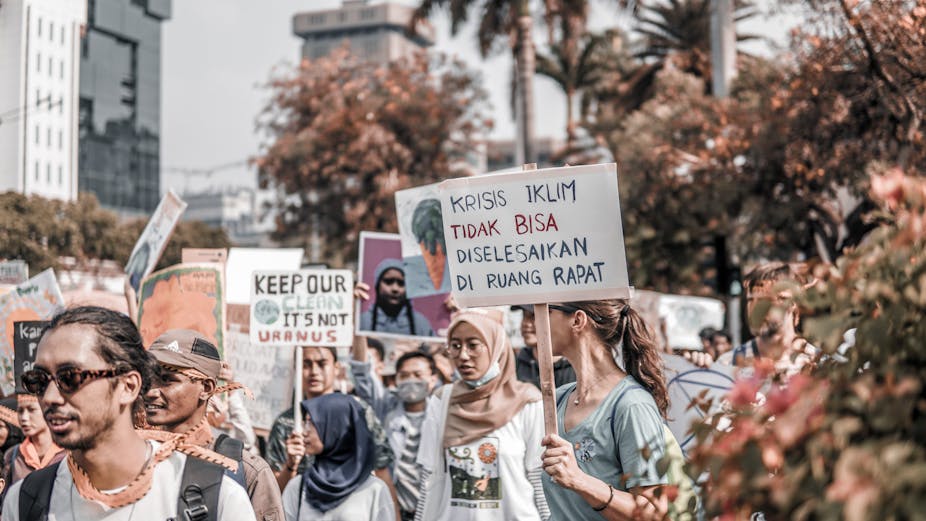Our study of young environmental activists in Indonesia found that Muslim youth activists based their environmentalism firmly on their knowledge of Islam. They see themselves as khalifahs – or God’s lieutenants on earth – undertaking the sacred task of guarding the natural world.
This echoes the growing popularity of “green Islam” as an important global youth agenda.
Indonesia has a poor record on environmental protection. There are significant problems of pollution and deforestation, despite hundreds of regulations and laws governing environmental management and protection. As Indonesia has grown economically, so has the negative impact on its environment.
Amid that concerning trend, some pious and fervent young Muslim environmentalists are committed to raising the consciousness of peers about ecological crises. They view environmental pollution and destruction as haram, or forbidden by Islamic law.
Tapping into religious epiphany
For the study, we talked to 20 environmental activists, aged 19–23, from campuses in Java and Sumatra. These young Muslim activists had solid academic knowledge that they used to shape their views on environmental practices based on Islamic theology.
For example, Pertiwi in Palembang, South Sumatra, attended an Islamic boarding school (or “pesantren”) where she studied Quranic verses in depth.
Later at university she joined a group campaigning against pollution of the Musi River through awareness-raising in riverside communities, lobbying major industrial polluters and organising river clean-up days.
Pertiwi says she based her environmental activism on a surah (chapter) in the Quran about the destruction of the Earth.
“Look at our ancestors, Allah [God] became very angry with them, right? He was not only angry because of human nature itself damaging the environment, but because of human actions directly violating something Allah had created,” she said.
She considers damaging the environment as haram, including littering.
“It violates the work of the Creator (…) God sees, hears and knows what humans do,” she explains.
Classmate Fahmi, on the other hand, studied chemical engineering. He joined the Palembang chapter of Sobat Bumi, an environmental movement initiated by Indonesia’s state-owned oil and natural gas corporation, Pertamina.
Fahmi experienced a religious epiphany when climbing up through cloud forests in a national park where he realised the truth of what was said in the Quran.
“If someone takes care of the surrounding environment, then God will look after them, both in this world and in the hereafter. […] And His gratitude is truly manifested when we come to regret mistakes such as littering the fresh environment that gives us the air we breathe,” he said.
One of our other respondents in Bandung, West Java, Iin was an active member of Youth for Climate Change (YFCC) Indonesia. She believes it is an order from God for humans to behave as a khalifah, or God’s guardians on Earth.
“The term khalifah is mentioned in the verse that states, ‘[The] Lord said to the angels: 'I am placing on the Earth one that shall rule as My deputy [viceregent or lieutenant]’” she quotes (Quran 2:30).
She also took pride in her career aspirations in nature conservation.
“I know the salary will not be as big as what I would get working for an oil and gas company. But I don’t have a problem with that, because I have been paid by God with my breath, food to eat and the means to live my daily life,” she said.
In the capital Jakarta, meanwhile, another participant in our study named Heri joined a university-led campaign to clean up the Ciliwung River – one of the most polluted rivers in the world.
“There is environmental education in my religion. Harmony must be both vertical and horizontal, ”hablum minallah, hablun minannas“. It explains how you should interact socially with the environment,” Heri who attended a madrasah (Islamic school) said.
Heri’s words echo those of Mustofa Bisri (commonly known as Gus Mus), a popular theologian affiliated with Indonesia’s largest Muslim organisation, Nahdlatul Ulama (NU). He once tweeted that human life in the world is not only related to Allah (hablum minallah), but also to fellow humans (hablum minannas) and to the environment/nature (hablum minal alam).
It references the Quranic paradigm of holding fast to the “rope” of God as a multi-dimensional article of faith, one that encodes the common theological belief of harmony – “as above, so below”.
The young activists often drew on these Quranic references to explain their moral responsibility of conservation and reparation. The purity of nature was understood to reflect God’s transcendent goodness in creation.
They felt a moral duty to prevent other Indonesians from causing environmental pollution and destruction. They also campaigned actively to bring local Muslim polluters and destroyers back to the faith.
For example, a favoured T-shirt depicted the crescent moon and star, stating: “Even when doomsday comes, if someone has a palm shoot in his hand, he should plant it.”
The young activists sometimes alluded to their environmental struggle as an arduous journey guided by God. Yet they were not disheartened as they believed they would be rewarded in the hereafter for their work as a khalifah.
A moral basis for green action
In the new “green” Islam, young Muslim environmentalists use their Islamic views to construct a critical community that sets out to preserve and sustain the natural world.
“Green Islam” is important because it offers a deep account of moral reasoning for environmental action in the world.
In contrast, many secular strategies for mitigation of climate change rely either on dry scientific claims, or on abstract global values, which may lack relevance to the personal, spiritual dimension.


